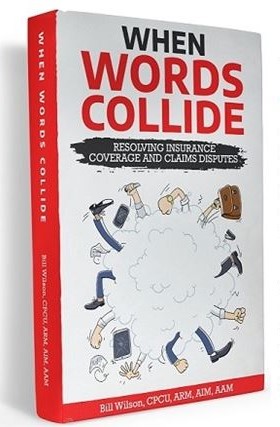Bill Wilson’s book When Words Collide is a witty and well-written road map that guides the reader through the complex world of insurance coverage and claims disputes.
Bill Wilson is an insurance educator, writer, speaker, and founder of the InsuranceCommentary.com. He has served as a trainer and speaker for various organizations, including the International Risk Management Institute (IRMI) and the Risk & Insurance Managers Society (RIMS). Bill has conducted hundreds of insurance seminars and was dubbed, “the nation’s foremost leading expert on form coverage, and technical issues.”
Bill understands insurance policies at a cellular level. His book teaches the reader how to dissect the mechanisms of confusing policy terms and forms that every insurance industry professional should know. From the very beginning, Bill draws in the reader by referencing pop culture to explain complex insurance concepts. Bill’s range is impressive. He cites Shakespeare, rock stars, and even Inigo Montoya from The Princess Bride: “You keep using that word. I do not think it means what you think it means.” This notably made the book a very entertaining read.
The book begins with Bill’s Ten Policy Interpretation Basics, similar to the Ten Commandments – except for Policy Interpretation. Some of my personal favorites included “Insurance is NOT a commodity” and “RTFP!” This is short for “Read the Full Policy.” However, Bill admits that there are occasions where the “F” has taken on a different connotation. For example, when it is clear that nobody has read the policy, to the detriment of the insured. It’s Bill’s wit and humor that really keeps you reading. These rules of policy interpretation are referenced throughout the book and are woven into the fabric of what it takes to understand an insurance policy.
One of my favorite chapters of the book involved Syntactic Ambiguities, meaning the “arrangement of words.” Bill cites case law1 as an example of coverage hinging on the placement of a comma in a definition. The existence, nonexistence, or even placement of punctuation can create a complete difference in meaning. My favorite example of this is illustrated below.
- A woman without her man is nothing.
- A woman, without her, man is nothing.
Bill draws from numerous insurance sources such as case law, IRMI, and even leading insurance blogs such as Coverage Opinions by Attorney Randy Maniloff, and the Merlin Law Group Property Insurance Coverage Law blog. These are notably two of my favorite blogs – but I may be biased!
In conclusion, the book delivers exactly what it sets out to accomplish from the very beginning – which is to serve as a guide for insurance policy provisions in an interesting and conversational way. I might even add, in a fun way.
For more great reads for the insurance professional, make sure to check out Attorney Chip Merlin’s book, Pay Up!
_____________________________
1 Liebovich v. Minnesota Ins. Co., 751 N.W.2d 764 (Wis. 2008).





